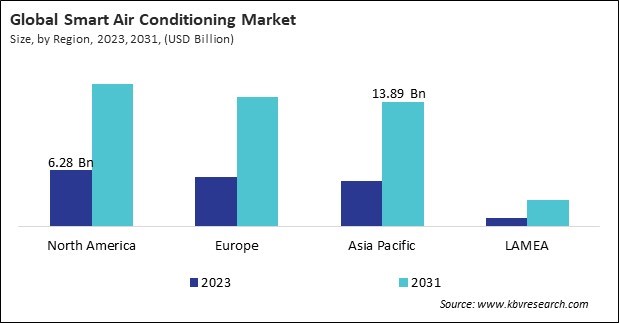According to a new report, published by KBV research, The Global Smart Air Conditioning Market size is expected to reach $47.11 billion by 2031, rising at a market growth of 13.1% CAGR during the forecast period.
The Residential Buildings segment is leading the Global Smart Air Conditioning Market by Application in 2023; thereby, achieving a market value of $21.56 billion by 2031. The rising adoption of smart home technologies and growing consumer preference for energy-efficient appliances have driven the demand for smart air conditioning systems in residential spaces. Features such as remote control, voice commands, and integration with home automation systems enhance user convenience and contribute to the segment’s growth. Additionally, increasing urbanization and constructing modern housing projects further boost market expansion in this segment.

The Integrated control segment is anticipating a CAGR of 13.4% during (2024 - 2031). Integrated control systems offer a unified solution for managing temperature, humidity, and ventilation through a single interface. The growing popularity of smart home ecosystems has accelerated the demand for these systems as they provide improved convenience and automation. Additionally, businesses are increasingly adopting integrated controls to enhance indoor air quality and ensure compliance with energy regulations.
Full Report: https://www.kbvresearch.com/smart-air-conditioning-market/
The North America region dominated the Global Smart Air Conditioning Market by Region in 2023, and would continue to be a dominant market till 2031; thereby, achieving a market value of $15.8 billion by 2031. The Europe region is experiencing a CAGR of 12.9% during (2024 - 2031). Additionally, The Asia Pacific region would exhibit a CAGR of 13.7% during (2024 - 2031).
By Application
By Product
By Geography
 Unique Offerings
Unique Offerings